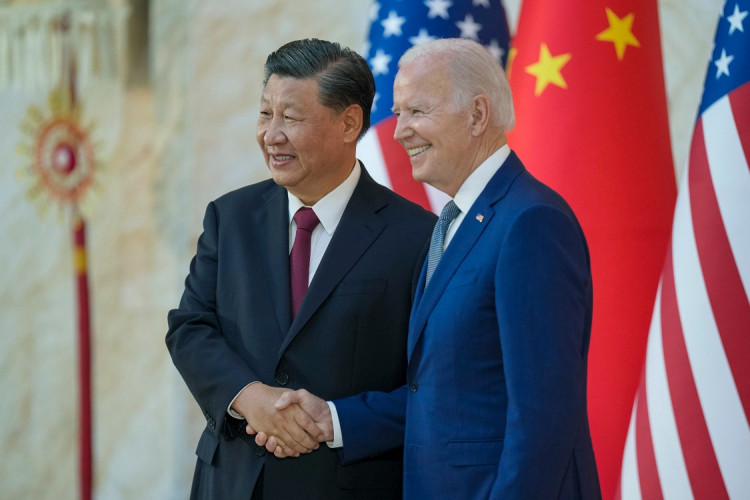Following hints in U.S. media, President Biden formally signed an executive order on August 9, curbing American businesses' investments in "countries of concern" that delve into sensitive national security technologies and products.
The order primarily pinpoints three sectors: semiconductors and microelectronics, quantum information technology, and artificial intelligence (AI). While the phrase "countries of concern" is used throughout the order, its annex lists only China, inclusive of mainland, Hong Kong, and Macau.
The U.S. Treasury Department will subsequently roll out detailed guidelines for executing this order. A draft proposal has been made public by the Treasury, seeking feedback from the general populace. Based on their plans, U.S. firms will be outright banned from investing in two of the sectors, while investments in certain AI systems will need to be disclosed.
According to the executive order released by the White House on August 9, these "countries of concern" are developing critical technologies for military, intelligence, surveillance, and cyber capabilities.
Rapid advancements by these nations in semiconductors, quantum tech, and AI could bolster their capacity, aiding in the creation of advanced weaponry, codebreaking, gaining military supremacy, and threatening U.S. national security.
Biden articulated in the order that to address these national security threats, he has directed the heads of the Treasury and Commerce Departments, among others, to release new rules post public consultation. These rules will restrict American investments in the aforementioned sectors in the "countries of concern."
Specific Restrictions Envisioned
On Wednesday, the Treasury Department posted a proposal on its official website, contemplating a direct ban on U.S. companies investing in Chinese firms involved in semiconductors, microelectronics, and quantum info tech. These investments include private equity, venture capital, and joint ventures.
For the semiconductor and microelectronics sector, the department plans to ban investments in Chinese companies engaged in the R&D of electronic design automation software, semiconductor manufacturing equipment, advanced integrated circuit design, manufacturing, or packaging, and supercomputer sales and installation. Additionally, U.S. companies might need to notify the Treasury Department when investing in less advanced integrated circuit design, manufacturing, and packaging.
For quantum information technology, the focus is on prohibiting investments in Chinese entities involved in quantum computer manufacturing and select component production, certain quantum sensor R&D, and quantum networking and communication system R&D.
Regarding AI, the department contemplates necessitating American companies to disclose investments in Chinese firms. However, it's not an outright ban. Areas that require disclosure encompass software equipped with AI systems potentially used for military or intelligence activities that could threaten U.S. national security.
The department is also considering banning investments in Chinese entities specializing in AI software for national security applications, such as military surveillance. Feedback from industry experts is currently being solicited.
The new restrictive rules are slated to be implemented next year. Some Republicans have voiced their displeasure over the timing and scope, arguing that investments in critical tech sectors in China should be halted immediately.
Due to the series of U.S. restrictions, direct American investments in China have seen a decline. According to Rhodium Group, last year's U.S. direct investments in China dropped to $8.2 billion, a 20-year low, and U.S. venture capital investments in China plunged to $1.3 billion, the lowest in a decade.
In response to the new executive order, the National Venture Capital Association commented that it's currently in a wait-and-see mode, gauging if the measures could lead to "unintended consequences" for American businesses.
The Financial Times reported that anonymous U.S. officials hope other allies will introduce similar restrictions after Biden's executive order. Officials indicated Japan doesn't plan to follow suit, but the UK, Germany, and the European Commission have expressed interest.
China's Foreign Ministry spokesman responded on Thursday, strongly condemning and opposing the U.S.' determined approach to limiting investments. The spokesperson accused the U.S. of hiding behind national security concerns, aiming to deprive China of its development rights and safeguarding its own hegemonic interests, labelling the actions as economic coercion and technological bullying.
China urged the U.S. to adhere to President Biden's commitments of not seeking to decouple from China or hinder its economic growth. They called for an end to the politicization, weaponization, and tooling of trade and technology issues, and urged the U.S. to immediately revoke the decision, cancel the investment restrictions, and foster a conducive environment for Sino-U.S. trade cooperation. China emphasized its intentions to closely monitor these developments and resolutely defend its own rights and interests.





